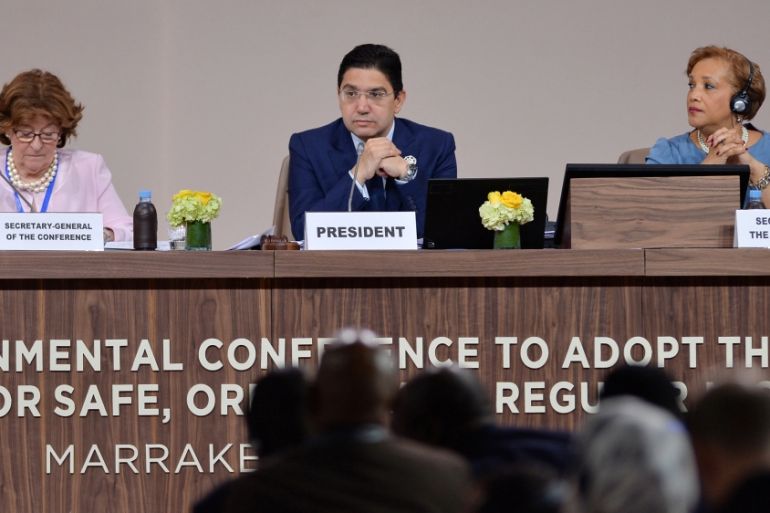Morocco’s migrants treatment under spotlight after UN conference
The North African country hosted this week a major intergovernmental conference on migration.

Marrakech, Morocco – Morocco’s treatment of sub-Saharan African migrants returned to the spotlight this week as the North African country hosted a two-day intergovernmental conference on migration.
Leaders from 164 UN member states on Monday agreed to adopt the Global Compact for Safe, Orderly and Regular Migration (GCM) in Marrakech despite opposition and withdrawals by several countries, including the United States.
Keep reading
list of 4 itemsBirth, death, escape: Three women’s struggle through Sudan’s war
Does Israel twist humanitarian law to justify Gaza carnage?
Vatican denounces gender-affirming surgery, gender theory and surrogacy
A non-binding agreement, the GCM aims to better manage migration at local, national, regional and global levels, including reducing the risks and vulnerabilities faced by migrants or refugees at different stages of their journey.
But as the host country faces allegations of ongoing human rights violations and a “cruel and unlawful” crackdown against sub-Saharan African migrants, its minister of foreign affairs defended Morocco’s handling of the situation.
“Morocco gave residency permits to 50,000 migrants, easing access to the job market, health and education,” Nasser Bourita said at the conference’s closing on Tuesday, calling Marrakech “the capital of migration”.
“At the same time, Morocco is fighting smuggling and human trafficking networks that are using the territory to endanger the lives of these migrants. We’ve dismantled the trafficking cells and worked to save the lives of a large number of migrants.”
Rights groups, activists and migrants have shared details with Al Jazeera of routine police raids against those from sub-Saharan African countries.
The migrants in the north of the country, hoping to either enter Ceuta or Melilla – the two Spanish enclaves in Africa – or take the sea route through the Mediterranean, are routinely taken to the south of the country. Some complained of their possessions being destroyed.
According to Amnesty International, at least 5,000 people have been “swept up in the raids” around Morocco, “piled on to buses and abandoned in remote areas close to the Algerian border or in the south”.
The UK-based rights group has termed the “large-scale crackdown” as “cruel and unlawful”.
“I have been taken to the south 10 times,” a migrant from Ivory Coast, who did not wish to be identified, said at a camp by the main bus station in the port city of Casablanca.
“I was arrested and put in a police car with dogs. From the police station, I was put on a bus with other migrants and taken near the Algerian border. I then had to beg on the streets to make enough money for a bus ride back up.”
Moroccan authorities have labelled such abuse and harassment claims baseless, arguing that the evictions are taking place “in accordance to the country’s laws”.
“We encourage migrants to settle down in Morocco but can’t allow behaviour that is against our laws and act before a crime (undocumented migration into Europe) is committed,” Khalid Zerouali, Morocco’s border control chief, said.
Bourita, meanwhile, blamed “decisions taken elsewhere” for the situation that Morocco finds itself in, arguing that with Italy closing its ports to migrants, the movement of these people increased in the western Mediterranean between the North African country and Spain.
“Traffic on the central route from Libya to Italy has gone down by 150 percent, which means that we are facing networks who are adapting their strategies to the reaction of different European countries. But in dealing with this, Morocco is applying its law,” he said.
Despite that, the situation in Morocco leaves “room for improvement”, according to the Francesco Rocca, president of the International Federation of Red Cross and Red Crescent Societies.
“Morocco is an important part of the migratory route. This is not a recent issue. It will always be affected by that,” Rocca told Al Jazeera.
“I think there’s room for improvement. But this conference being hosted in Morocco must be seen as a good signal towards improvement. We know there have been difficulties and Morocco has faced a lot of challenges. But this pact on migration will surely create more awareness.”